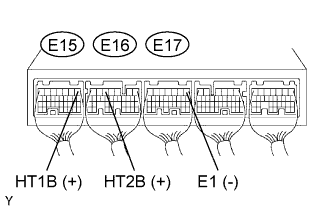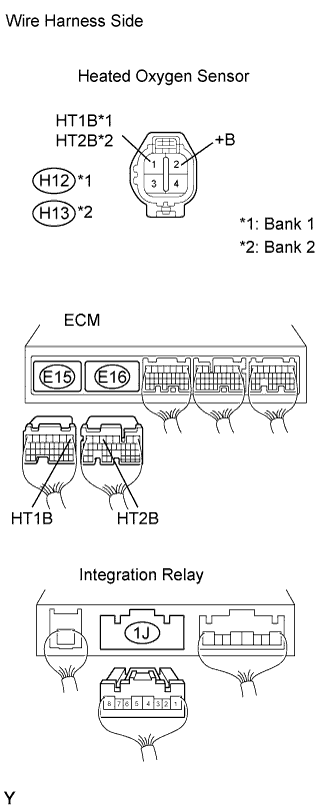Dtc P0037 Oxygen Sensor Heater Control Circuit Low (Bank 1 Sensor 2)
DESCRIPTION
MONITOR DESCRIPTION
WIRING DIAGRAM
INSPECTION PROCEDURE
INSPECT HEATED OXYGEN SENSOR (HEATER RESISTANCE)
INSPECT INTEGRATION NO.1 RELAY (MAIN RELAY)
CHECK ECM (HT1B, HT2B VOLTAGE)
CHECK WIRE HARNESS (HEATED OXYGEN SENSOR - ECM AND INTEGRATION RELAY (MAIN RELAY))
DTC P0037 Oxygen Sensor Heater Control Circuit Low (Bank 1 Sensor 2) |
DTC P0038 Oxygen Sensor Heater Control Circuit High (Bank 1 Sensor 2) |
DTC P0057 Oxygen Sensor Heater Control Circuit Low (Bank 2 Sensor 2) |
DTC P0058 Oxygen Sensor Heater Control Circuit High (Bank 2 Sensor 2) |
DESCRIPTION
- Refer to DTC P0136 (Toyota Fortuner RM000000TEO00JX.html).
- HINT:
- When any of these DTCs are set, the ECM enters fail-safe mode. The ECM turns off the heated oxygen sensor (HO2S) heater in fail-safe mode. Fail-safe mode continues until the ignition switch is turned OFF.
- The ECM uses a pulse width modulated control circuit to adjust current through the heater. The heated oxygen sensor heater circuit uses a relay on the +B side of the circuit.
DTC No.
| DTC Detection Condition
| Trouble Area
|
P0037
P0057
| Heated oxygen sensor (HO2S) heater current less than 0.3 A
(1 trip detection logic)
| - Open in heated oxygen sensor heater (bank 1, 2 sensor 2) circuit
- Heated oxygen sensor heater (bank 1, 2 sensor 2)
- Integration relay
- ECM
|
P0038
P0058
| Heated oxygen sensor (HO2S) heater current more than 2 A
(1 trip detection logic)
| - Short in heated oxygen sensor heater (bank 1, 2 sensor 2) circuit
- Heated oxygen sensor heater (bank 1, 2 sensor 2)
- Integration relay
- ECM
|
- HINT:
- Bank 1 refers to the bank that includes the No. 1 cylinder.
- Bank 2 refers to the bank that does not include the No. 1 cylinder.
- Sensor 1 refers to the sensor closer to the engine assembly.
- Sensor 2 refers to the sensor farther away from the engine assembly.
MONITOR DESCRIPTION
- The sensing portion of the heated oxygen sensor has a zirconia element which is used to detect oxygen concentration in the exhaust. If the zirconia element is at the appropriate temperature and the difference of the oxygen concentrations between the inside and outside surface of the sensor is large, the zirconia element will generate voltage signals. In order to increase the oxygen concentration detecting capacity of the zirconia element, the ECM supplements the heat from the exhaust with the heat from the heating element inside the sensor. When the current in the sensor is out of the standard operating range, the ECM interprets this as a fault in the heated oxygen sensor heater and sets a DTC.
- Example:
- The ECM will set a high current DTC if the current in the sensor is more than 2 A when the heater is OFF. Similarly, the ECM will set a low current DTC if the current is less than 0.3 A when the heater is ON.
WIRING DIAGRAM
Refer to DTC P0136 (Toyota Fortuner RM000000TEO00JX.html).
INSPECTION PROCEDURE
- HINT:
- Read freeze frame data using the intelligent tester. Freeze frame data records the engine conditions when a malfunction is detected. When troubleshooting, freeze frame data can help determine if the vehicle was running or stopped, if the engine was warmed up or not, if the air-fuel ratio was lean or rich, and other data, from the time the malfunction occurred.
- Sensor 1 refers to the sensor mounted before the Three-Way Catalytic Converter (TWC) and is located near the engine assembly.
- Sensor 2 refers to the sensor mounted after the TWC and is located far from the engine assembly.
| 1.INSPECT HEATED OXYGEN SENSOR (HEATER RESISTANCE) |
Disconnect the H12 and H13 heated oxygen sensor connectors.
Measure the resistance of the sensor.
- Standard resistance:
Bank 1Tester Connection
| Condition
| Specified Condition
|
1 (HT1B) - 2 (+B)
| 20°C (68°F)
| 11 to 16 Ω
|
1 (HT1B) - 4 (E2)
| -
| 10 kΩ or higher
|
Bank 2Tester Connection
| Condition
| Specified Condition
|
1 (HT2B) - 2 (+B)
| 20°C (68°F)
| 11 to 16 Ω
|
1 (HT2B) - 4 (E2)
| -
| 10 kΩ or higher
|
| | REPLACE HEATED OXYGEN SENSOR |
|
|
| 2.INSPECT INTEGRATION NO.1 RELAY (MAIN RELAY) |
Disconnect the 1J integration relay connector from the engine room junction block (Toyota Fortuner RM0000014TJ00HX.html).
Measure the voltage of the MAIN relay.
- Standard resistance:
Tester Connection
| Condition
| Specified Condition
|
1J-5 - Body ground
| Ignition switch ON
| 10 to 14 V
|
| | REPLACE INTEGRATION NO.1 RELAY |
|
|
| 3.CHECK ECM (HT1B, HT2B VOLTAGE) |
Turn the ignition switch ON.
Measure the voltage of the ECM connector.
- Standard voltage:
Tester Connection
| Specified Condition
|
E15-1 (HT1B) - E17-1 (E1)
| 9 to 14 V
|
E16-5 (HT2B) - E17-1 (E1)
| 9 to 14 V
|
| 4.CHECK WIRE HARNESS (HEATED OXYGEN SENSOR - ECM AND INTEGRATION RELAY (MAIN RELAY)) |
Disconnect the H12 or H13 sensor connectors.
Disconnect the E15 or E16 ECM connector.
Disconnect the 1J integration relay connector from the engine room junction block (Toyota Fortuner RM0000014TJ00HX.html).
Measure the resistance of the wire harness side connectors.
- Standard resistance:
Bank 1 Sensor 2Tester Connection
| Specified Condition
|
H12-1 (HT1B) - E15-1 (HT1B)
| Below 1 Ω
|
H12-2 (+B) - 1J-5
| Below 1 Ω
|
H12-1 (HT1B) or E15-1 (HT1B) - Body ground
| 10 kΩ or higher
|
H12-2 (+B) or 1J-5 - Body ground
| 10 kΩ or higher
|
Bank 2 Sensor 2Tester Connection
| Specified Condition
|
H13-1 (HT2B) - E16-5 (HT2B)
| Below 1 Ω
|
H13-2 (+B) - 1J-5
| Below 1 Ω
|
H13-1 (HT2B) or E16-5 (HT2B) - Body ground
| 10 kΩ or higher
|
H13-2 (+B) or 1J-5 - Body ground
| 10 kΩ or higher
|
| | REPAIR OR REPLACE HARNESS AND CONNECTOR |
|
|




